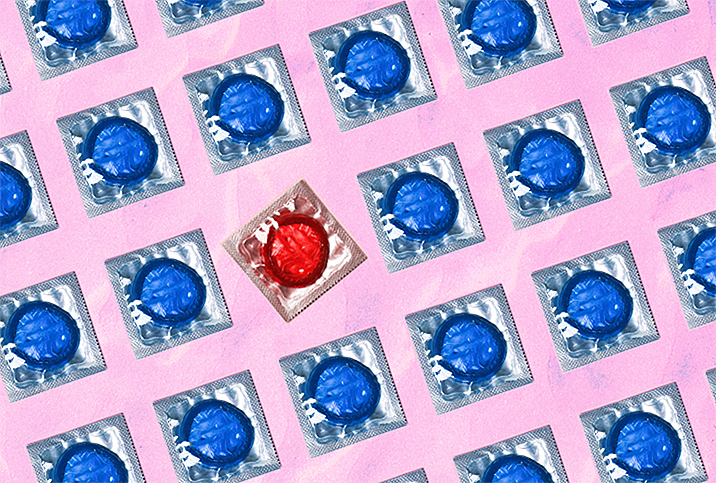Having Sex When You Have OCD

Sex can be vitally important for men and women in any relationship. But for someone who suffers from obsessive-compulsive disorder (OCD), it can become the focus of an obsession.
OCD is a chronic mental health condition marked by repetitive and intrusive thoughts or sensations, or the impulse to do something over and over again. This disease affects an estimated 1 to 3 percent of the population.
Studies indicate up to half of all OCD patients report experiencing sexual dysfunction. Here are some common signs that your sex life may be affected by obsessive-compulsive disorder:
Fear of contamination during sex
When it comes to sex and OCD, you may feel irrational fear of contamination, and that might put you off having intercourse at all. Perhaps you're concerned your partner may have a disease or you may just want to avoid contact with their bodily fluids.
Decreased sex drive and inability to reach orgasm during sex
Obsessive-compulsive disorder is also known to cause decreased libido or sex drive. Studies into OCD and sex indicate women with the disorder, for example, are generally more avoidant and nonsensual and may have difficulty reaching orgasm. OCD can cause both men and women to have trouble becoming aroused or getting in the mood for sex.
Obsessing over sexual orientation
Some people suffer from sexual orientation OCD (SO-OCD), a subtype of OCD where an individual constantly questions their sexual orientation. Heterosexual men and women may have intrusive thoughts about being gay or having an attraction to someone of the same sex. On the other hand, gay men and women may have thoughts about being attracted to people of the opposite sex. This can obviously become confusing if desires aren't aligning with sexual identity.
Anxiety and depression with OCD and sex
The type of anxiety generally associated with mental disorders like OCD is related to sexual dysfunction. High levels of anxiety may be associated with obsessions that can interfere with sexual function. People who suffer from obsessive-compulsive disorder are usually anxious about a variety of issues, both sexual and nonsexual. This can often lead to reduced libido or simply keep them from being present in the moment and fully engaged during sex.
On the other hand, studies indicate sex could actually be an antidote to anxiety and OCD symptoms. OCD is characterized by low levels of serotonin, and sex is known to boost serotonin levels. Some OCD medications such as selective serotonin reuptake inhibitors(SSRIs)—you may be more familiar with the brand names Luvox, Paxil, Prozac and Zoloft—can increase the amount of serotonin in the brain. In this way, some people find their symptoms of OCD to be alleviated not only via their prescribed drugs but also by sex itself.
Obsessing over pregnancy
Some OCD patients worry about becoming pregnant or impregnating someone. While this is a common worry for many sexually active people who are not looking to procreate, people with OCD worry to an extreme extent, and their fears and worries may be completely irrational.
For example, women with obsessive-compulsive disorder may wash their hands constantly to remove semen they imagine they may have touched unknowingly during the day, or they may avoid public bathrooms altogether out of fear that they'll be at risk of somehow getting pregnant.
Men with OCD may resist touching people out of fear that one of their sperm could be transferred to an unsuspecting female through some action as innocent and unlikely as a handshake.
How is OCD treated?
If you are struggling with the challenges associated with OCD and sex, you may find that mindfulness activities and exposure and response prevention (ERP) therapy may be helpful.
According to the Mayo Clinic, mindfulness activities include meditation where you focus on what you're feeling without trying to interpret or judge your honest thoughts. Using breathing techniques and other practices, the overall goal is stress reduction and relaxation.
ERP is a type of cognitive behavioral therapy (CBT) in which you voluntarily and repetitively expose yourself to fears—the thoughts, situations, objects and images that trigger your anxieties—all guided by the presence of a professional therapist. Then, referring to the "response prevention" part of ERP, you are encouraged to make choices about your behavior, forcing your brain to recognize how irrational your responses have been.
Through therapy, you're taught to experience an intrusive thought, but by practicing mindfulness, you learn to let it be, accept the thought and not assign any weight to it.
Cognitive behavioral therapy teaches people with OCD to identify negative thinking patterns, and accept and replace them with positive thoughts and habits.
OCD and relationships
If you're suffering from OCD and you're in a relationship, it's vital that you tell your partner about your condition. The more they understand your OCD symptoms, the better you'll trust each other.
Of course, there's a lot your partner needs to understand about you and your obsessive-compulsive disorder. But if your partner senses you're having intrusive thoughts that are pulling you away during sex, they'll know it's not you, it's your OCD.
And that alone can prevent major misunderstandings which can interfere with a healthy sexual relationship.


















